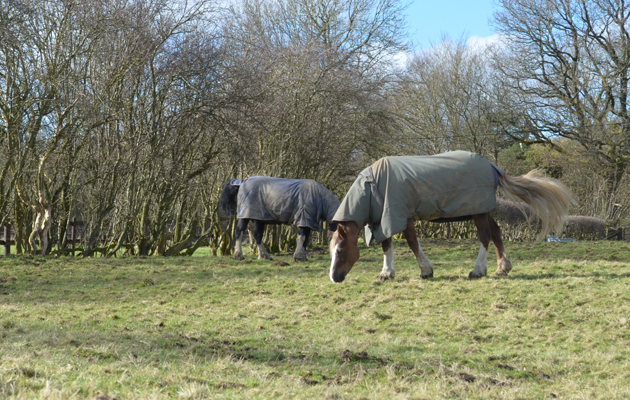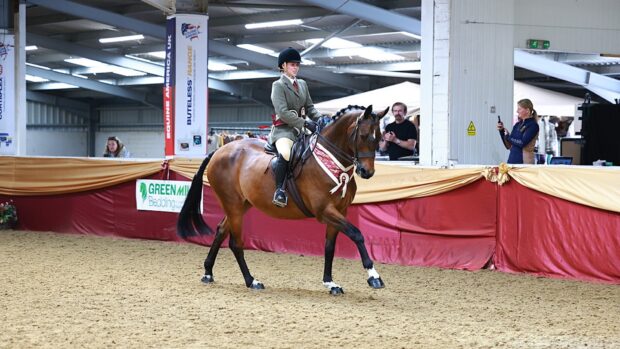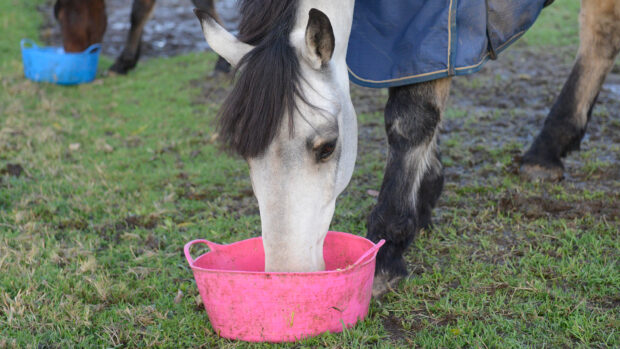Horse & Hound offers expert advice on how to keep an active veteran Irish Sport Horse in perfect condition this winter
Katie Grimwood, a nutritionist from Baileys Horse Feeds, assesses the following case study:
Horse: Benjamin, 24-year-old, 15.2hh Irish Sport Horse, weighing approximately 500kg
Feeding issue: veteran, starting to lose a little weight and can be lethargic
Owner’s thoughts: “Ben is still perfectly sound and enjoys outings, but just doesn’t have the joie de vivre he used to, and I don’t want him to lose any more weight this winter.”
Work schedule: has evented at grassroots level in the past, occasional hunting during the winter, along with light hacking and flatwork schooling.
Current diet: 2.5kg low-energy mix, 1½ mugs of a feed balancer, 1kg dried grass chaff, sugar beet, mineral and vitamin supplement, divided between three meals a day.
Suggested feed programme by Katie:
“If your older horse is losing weight and lacking energy, then you could look at replacing the low-energy mix with a higher calorie conditioning feed. For example, from the Baileys range, the No. 4 Top Line Conditioning Cubes would be appropriate. These will offer more calories/energy per scoop, helping to build and maintain weight and condition. The digestibility of Top Line Conditioning Cubes also makes them an excellent choice for the older equine, especially those with poor dentition since they can be easily softened with warm water or soaked beet pulp.
“I would suggest building up to 2.5-3kg per day (split between three meals), and this will increase calorie/energy intake.
“Please note, that for those horses requiring a low starch diet (for example for reasons including PPID (Cushing’s disease), Equine Metabolic Syndrome (EMS), laminitis, gastric ulcers or tying up), a lower starch feed such as No. 21 Ease & Excel may be preferable.
“A small amount of beet and chaff can be continued if the owner prefers, though these are not necessarily essential, as long as plenty of fibre is consumed (an ad lib provision of hay/haylage is ideal). Providing a sufficient fibre intake is also important to support digestive health, as well as to help maintain weight and condition.
“You would not need to continue with the vitamin and mineral supplement or the balancer, as the Top Line Conditioning Cubes (or Ease & Excel) will supply a fully balanced diet when fed to recommended levels.
“As horses get older, they may become less efficient at absorbing nutrients from their feed. They may also find it harder to digest fibre, as the fibre- digesting micro-organisms in the hindgut can become less efficient. I would also like to recommend the use of our Digest Plus prebiotic supplement. To provide further support, a prebiotic supplement (such as Digest Plus) will help to encourage a healthy gut function by effectively providing a food source for the beneficial bacteria in the hindgut. This supplement can be used long term and so would be suitable to support Benjamin’s overall digestive health and helping him to get the most out of his feed and support his weight and condition.”
When is a horse ‘old’?
We all age at different rates according to our lifestyle, diet, exercise and of course genetics and it’s the same for horses and ponies. Just like humans, horses are living longer as research improves our understanding, with careful management enabling horses to lead active lives late into their twenties. The most common problem that we as owners often face is deciding when our horses are “old” and when, or if, they require a diet designed specifically for the older horse. Like people, horses age at different rates and feeding a horse a “veteran” feed just because he is about to have his 18th birthday may not be the most suitable option. The main thing to remember is to treat your horse as an individual, just as you would a younger horse.
If your older horse or pony has a history of problems such as laminitis, Cushing’s or tying-up, this can limit your feeding options. Ideally, the starch levels in the feeds should be as low as possible. This generally means the avoidance of products such as mixes and cubes. However, the severity of these conditions can vary hugely so each horse should be considered individually.
The effects of old age
The loss of teeth or poor tooth condition is a common problem in older horses. This can affect their ability to chew, which could result in partially digested food causing blockages in the gut. As with any horse, be sure to have your horse’s teeth checked regularly to identify any problems.
Common signs of dental problems include quidding, where food is dropped out of the mouth, and balled up bits of hay or haylage that have been spat out. If he has difficulty chewing forage, you may wish to consider using higher quantities of shorter fibres in the diet, such as Light Chaff. For those horses with very few teeth left, a product such as Fibre-Beet is ideal as it is fed soaked so requires minimal chewing. Fibre is particularly crucial during the winter months, as it can add calories and aid in heat production for warmth.
As a general rule, most cubes will soak down to a softer concentrate feed. If more calories are required, then cubes fed in this way may be preferable to a mix.
Management tips for a veteran horse
All horses are individuals so require diets tailored to meet their particular requirements. There are some general management tips that can help to keep your older horse well and healthy.
• Older horses will become less dominant and may be bullied away from
food and shelter by younger horses. Ensure older horses have the opportunity to get to their feed and forage, and can escape the elements.
• The older horse may become quite fussy. Try adding small amounts of herbs, fruit juices or cordials for improved palatability, particularly if the horse has any medication. If softening the feed, use warm water to aid palatability.
• Implement the rules of feeding as extensively as possible by feeding small meals at frequent intervals to keep the horse interested and to support digestive efficiency.
• Implement an effective de-worming programme and have teeth checked regularly by a professional.
• Monitor any changes in your horse’s droppings. For example, large fibre strands in the droppings could indicate a reduced chewing ability.
Tracey Hammond, M.sC., an equine nutritionist from Dengie Feeds, says:
“Firstly, with a veteran horse that is not holding weight and lethargic there would be a couple of age associated issues that could be contributing such as poor dentition and PPID and so we would advise seeking veterinary advice to make sure the veteran horse is in good health.
“We would suggest any dietary change gradually over two weeks.”
If a veteran product that is fortified with vitamins and minerals is being fed at the full recommended quantity (typically 3kg for this size horse) then neither the balancer or the vitamin and mineral supplement will be required. If half the recommended amount is supplied then top up with ½ the suggested quantity of a balancer or vitamin and mineral supplement.
Getting older
The transition to old age will vary from horse to horse. Once a horse starts to show his years, owners should modify all aspects of management and feeding. Changing to a specialised veteran feed will be worth the extra cost. Like humans, older horses require certain additions to their diet.
Article continues below…
You might also be interested in:

8 ways to keep a veteran healthy this winter
With the cold, wet weather now here, make sure you know how to keep your veteran healthy this winter

9 problems owners of older horses will recognise
Do you own a veteran horse? A much-loved old stager of the equine world? Read on for nine problems which

Subscribe to Horse & Hound magazine today – and enjoy unlimited website access all year round
Check the bag of whatever you are feeding your veteran for some or all of these ingredients:
- Quality protein, providing essential amino acids in particular lysine, methionine and threonine. Ingredients that supply good quality protein and may be found in veteran feeds include soya, alfalfa and linseed.
- Essential fatty acids such as linolenic and linoleic, omega 3 and 6 respectively. Omega-3 is thought to be a natural anti-inflammatory and whilst the horses requirements aren’t known their usual grass based diet would be the horse’s natural source. Omega-3 can be supplemented in the horses ration by using linseed or linseed oil for example.
- As with every horse, a balanced ration is important for good health. Many vitamins and minerals are important antioxidants, vitamin C for example is known to be important for respiratory health. If feeding a fibre only ration, or less than recommended of a fortified feed top up with a broad-spectrum vitamin and mineral supplement or balancer to balance the ration.
“Dengie’s Pure Grass is 100% high temperature dried grasses and can be used to supplement or replace the forage ration in those that are struggling to chew, or for those that need a forage of superior nutritional quality in order to maintain their weight,” explains Tracey. “Dengie Alfa-Beet combines alfalfa and unmolassed sugar beet with a 15 minute hot soak or two-hour cold soak time. Alfa-Beet provides a source of highly digestible fibre for those that need help to maintain their weight and as it is fed soaked to a mash it is great for veterans with poor dentition as well.
“Alfa-Beet is naturally low in sugar and starch making it suitable for those that are laminitis prone such as veterans with PPID. Dengie Performance+ Balancer is particularly beneficial for the older horse and includes alfalfa and linseed as part of the formulation. As well as supplying a broad-spectrum of vitamins and minerals, Performance+ Balancer also supplies glucosamine for joint support and prebiotic for digestive support.”
Would you like to read Horse & Hound’s independent journalism without any adverts? Join Horse & Hound Plus today and you can read all articles on HorseandHound.co.uk completely ad-free.




